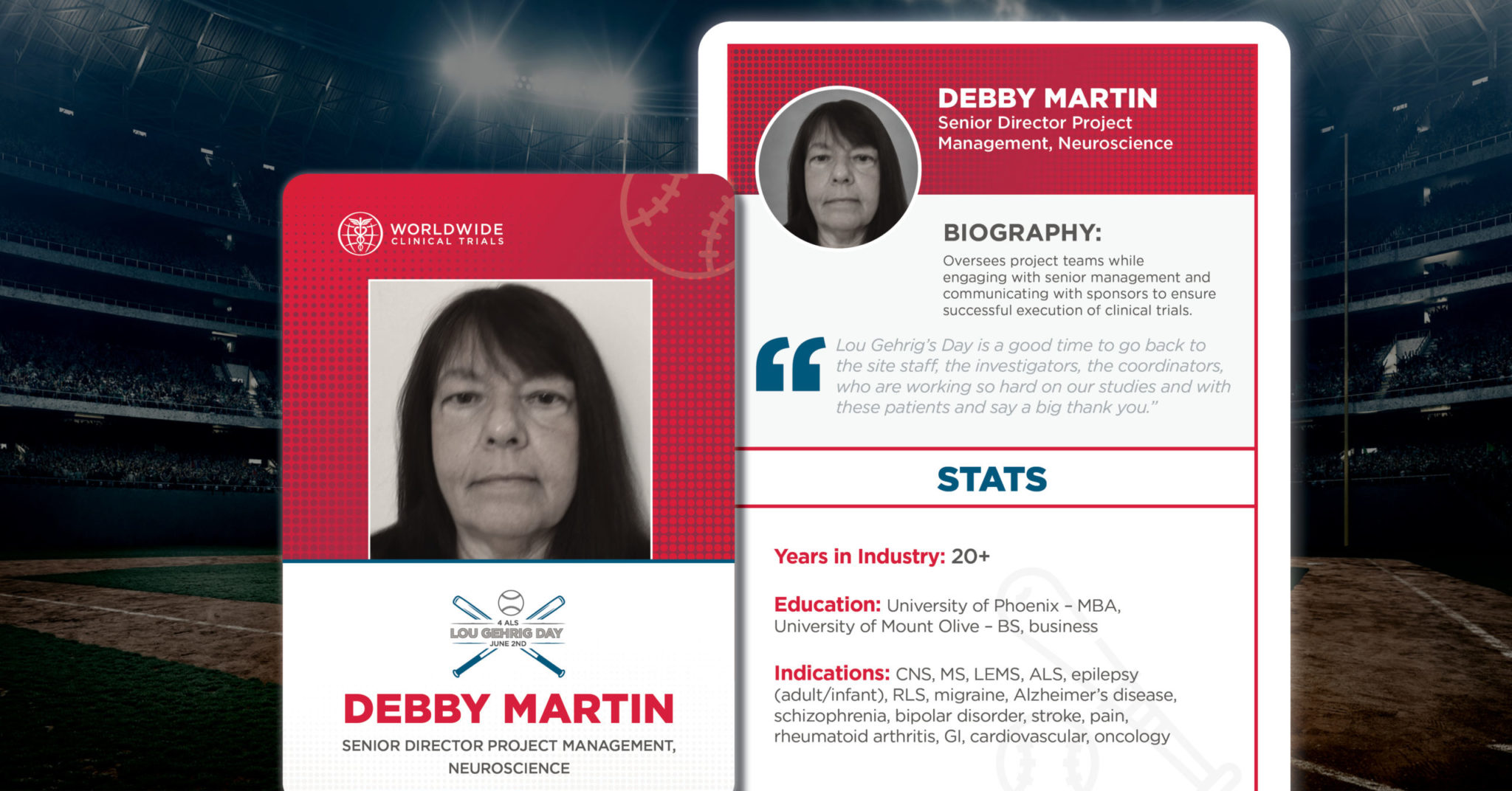
June 2 is Lou Gehrig Day, dedicated to promoting awareness about amyotrophic lateral sclerosis (ALS), also known as Lou Gehrig’s disease. At Worldwide Clinical Trials, our CNS experts are sharing their reflections on the importance of ALS research and what gives them hope for the future.
In this piece, Debby Martin, Senior Director of Project Management in Neuroscience, reflects on the emotional cost of ALS to patients, their caregivers, and their physicians.
My first personal involvement with ALS was through a coworker, whose husband was diagnosed while we were working together. They were a relatively young couple with two small children. It was painful to see the toll the disease took on her and the kids, and of course on her husband. It gave me a whole new perspective on the disease; suddenly, it was more than just a clinical trial for me.
An ALS diagnosis comes as a shock to the patient and to their family, and they can often enter into a grieving process. I’ve spoken with coordinators at trial sites who talk about how it’s a grieving process, having to face the reality of their condition and what it means for their future and their family.
An Emotional Cost
Those of us working in clinical research have to be empathetic to this emotional shock. Of course, we are eager to enroll patients so that we can advance our efforts to improve healthcare for these patients. But we must remember that the people we seek to enroll are grieving and facing a choice about what to do with the time they have remaining. Their families and caregivers must also be part of their decision. If the patient enrolls in a trial, family members will most likely be needed to support their participation in practical ways.
We must not forget the burden ALS studies place on the investigators at clinical sites. They are in that frontline position, working to meet the requirements of the study protocols while bearing the emotional cost of engaging with these patients during such a difficult time in their lives. Many times, we find that as we’re trying to enroll a study, the sites are also trying to support these patients through their grieving process.
For us on the research side, we must understand that once we have identified a patient, it may take some time for them to agree to come into the study. We need to let them process their diagnosis before we can expect them to make the commitment to participate in our research.
Operational Challenges
From an operational perspective, a lot of the challenges associated with ALS have to do with the nature of the sites. For ALS trials, we often are working with academic sites in large universities, so it can take quite a bit of time to get those sites up and running. The investigators at these sites are balancing many responsibilities, such as clinic days when patients are coming not only for study purposes but also for examinations and diagnosis. In a sense, our trial is in competition with the other responsibilities these investigators are fulfilling. They are very busy, but they are dedicated to your study because they want to do whatever they can to provide their patients with the best possible treatment opportunities.
The COVID-19 pandemic affected all areas of clinical research, but what’s remarkable about ALS treatment is that sites continued to bring patients in. Where many therapeutic indications saw sites having to close or switch to tele-visits, these clinics adapted by adjusting schedules, and they stayed open for their patients. This is a testament to the dedication of the investigators we work with on ALS studies.
Reasons to Hope
I’ve been doing this work for over 20 years, and I still think it’s incredible to see how science is continually evolving. In my current role at Worldwide Clinical Trials, I am overseeing two ALS programs, among other studies. It’s good to have more than one study ongoing in a rare disease like ALS because you can bring lessons learned from one team to the other, which benefits both studies. You can have a higher-level viewpoint to enable you to support project managers and their teams.
For Lou Gehrig Day this year, I want to thank those investigators who work so hard on our studies. Our site staff and coordinators work with these patients on a daily basis, taking on the protocol responsibilities and the emotional labor of helping patients and their families through difficult times.


